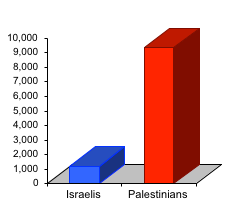| Antoon |
19 juni 2014 16:29 |
Citaat:
Oorspronkelijk geplaatst door Micele
(Bericht 7203523)
Citaat:
Oorspronkelijk geplaatst door Dixie
(Bericht 7203397)
of de haat die er voor 48 was en dus niet eens een Joodse staat?
|
Citaat:
geen bron = leugens...:-D
|
|
Citaat:
Antisemitism in the Arab world
...
Arab antisemitism is believed to have expanded since the 19th century. Jews, like other minority groups within the Muslim world, were subject to various restrictions long before that (see Dhimmi).
...
The Damascus affair was an accusation of ritual murder and a blood libel against Jews in Damascus in 1840. On February 5, 1840, Franciscan Capuchin friar Father Thomas and his Greek servant were reported missing, never to be seen again. The Turkish governor and the French consul Ratti-Menton believed accusations of ritual murder and blood libel, as the alleged murder occurred before the Jewish Passover. An investigation was staged, and Solomon Negrin, a Jewish barber, confessed under torture and accused other Jews. Two other Jews died under torture, and one (Moses Abulafia) converted to Islam to escape torture. More arrests and atrocities followed, culminating in 63 Jewish children being held hostage and mob attacks on Jewish communities throughout the Middle East. International outrage led to Ibrahim Pasha in Egypt ordering an investigation. Negotiations in Alexandria eventually secured the unconditional release and recognition of innocence of the nine prisoners still remaining alive (out of thirteen). Later in Constantinople, Moses Montefiore (leader of the British Jewish community) persuaded Sultan Abdülmecid I to issue a firman (edict) intended to halt the spread of blood libel accusations in the Ottoman Empire:
... and for the love we bear to our subjects, we cannot permit the Jewish nation, whose innocence for the crime alleged against them is evident, to be worried and tormented as a consequence of accusations which have not the least foundation in truth....
Nevertheless, pogroms spread through the Middle East and North Africa: Aleppo (1850, 1875), Damascus (1840, 1848, 1890), Beirut (1862, 1874), Dayr al-Qamar (1847), Jaffa (1876), Jerusalem (1847, 1870 and 1895), Cairo (1844, 1890, 1901–02), Mansura (1877), Alexandria (1870, 1882, 1901–07), Port Said (1903, 1908), and Damanhur (1871, 1873, 1877, 1891).
The Dreyfus affair of the late nineteenth century had consequences in the Arab world. Passionate outbursts of antisemitism in France were echoed in areas of French influence, especially Maronite Lebanon. The Muslim Arab press, however, was sympathetic to the falsely accused Captain Dreyfus, and criticized the persecution of Jews in France.
...
While antisemitism has increased in the wake of the Arab-Israeli conflict, there were pogroms against Jews prior to the foundation of Israel, including Nazi-inspired pogroms in Algeria in the 1930s, and attacks on the Jews of Iraq and Libya in the 1940s. In 1941, 180 Jews were murdered and 700 were injured in the anti-Jewish riots known as the Farhud.[17] Four hundred Jews were injured in violent demonstrations in Egypt in 1945 and Jewish property was vandalized and looted. In Libya, 130 Jews were killed and 266 injured. In December 1947, 13 Jews were killed in Damascus, including 8 children, and 26 were injured. In Aleppo, rioting resulted in dozens of Jewish casualties, damage to 150 Jewish homes, and the torching of 5 schools and 10 synagogues. In Yemen, 97 Jews were murdered and 120 injured.
...
In March 1921, Musa Khazem El Husseini, Mayor of Jerusalem, told Winston Churchill "The Jews have been amongst the most active advocates of destruction in many lands.... It is well known that the disintegration of Russia was wholly or in great part brought about by the Jews, and a large proportion of the defeat of Germany and Austria must also be put at their door."
...
Matthias Küntzel has suggested that the decisive transfer of Jewish conspiracy theory took place between 1937 and 1945 under the impact of Nazi propaganda targeted at the Arab world.[19] According to Kuntzel, the Nazi Arabic radio service had a staff of 80 and broadcast every day in Arabic, stressing the similarities between Islam and Nazism and supported by the activities of the Mufti of Jerusalem, Haj Amin al-Husayni (who broadcast pro-Nazi propaganda from Berlin). The Nazi regime also provided funding to the Egyptian Moslem Brotherhood, which began calling for boycotts of Jewish businesses in 1936.
Bernard Lewis also describes Nazi influence in the Arab world, including its impact on Michel Aflaq (a Christian), the principal founder of Ba'athist thought (which later dominated Syria and Iraq).
After the promulgation of the Nuremberg Laws, Hitler received telegrams of congratulation from all over the Arab and Muslim world, especially from Morocco and Palestine, where the Nazi propaganda had been most active.... Before long political parties of the Nazi and Fascist type began to appear, complete with paramilitary youth organizations, colored shirts, strict discipline and more or less charismatic leaders.
...
bron
|
|


